World Food Day 2021 – Speakers & Presenters
World Food Day Virtual Symposium
Friday, October 15 – 9:00 am Central Time
Ambassador Ahmed Awad
Former Minister of Foreign Affairs and International Cooperation, Federal Republic of Somalia
 Ambassador Ahmed Isse Awad is the former Minister of Foreign Affairs and International Cooperation of The Federal Republic of Somalia. He had the honor to reopen the Somali Embassy in Washington, D.C. after it has been closed for 24 years. Before his post in Washington, D.C., Ambassador Awad worked in peacebuilding for UN Peacekeeping missions in Sudan, where he promoted conflict resolution, peace, reconciliation and trust building, good governance, and the role of civil society in the peace process. Prior to joining the UN, Ambassador Awad participated as a resource person in the Somali Reconciliation Conference in Arta in Djibouti and the Somalia National Reconciliation Conference in Kenya. He also served as Chief of Staff of the Prime Minister for The Transitional National Government of Somalia. His work and interests include the promotion of peace and state-building in post-conflict societies, democratic governance, diplomacy, international relations, global affairs, and empowerment of youth and women. Ambassador Awad holds a master’s degree from the Institute of Peace and Security Studies of the Addis Ababa University and a bachelor’s degree from Concordia University in Montreal, Canada.
Ambassador Ahmed Isse Awad is the former Minister of Foreign Affairs and International Cooperation of The Federal Republic of Somalia. He had the honor to reopen the Somali Embassy in Washington, D.C. after it has been closed for 24 years. Before his post in Washington, D.C., Ambassador Awad worked in peacebuilding for UN Peacekeeping missions in Sudan, where he promoted conflict resolution, peace, reconciliation and trust building, good governance, and the role of civil society in the peace process. Prior to joining the UN, Ambassador Awad participated as a resource person in the Somali Reconciliation Conference in Arta in Djibouti and the Somalia National Reconciliation Conference in Kenya. He also served as Chief of Staff of the Prime Minister for The Transitional National Government of Somalia. His work and interests include the promotion of peace and state-building in post-conflict societies, democratic governance, diplomacy, international relations, global affairs, and empowerment of youth and women. Ambassador Awad holds a master’s degree from the Institute of Peace and Security Studies of the Addis Ababa University and a bachelor’s degree from Concordia University in Montreal, Canada.
Hon. David Beasley
Executive Director, United Nations World Food Programme
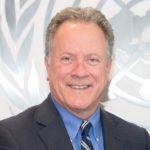 On 29 March 2017, United Nations Secretary General António Guterres and Food and Agriculture Organization (FAO) Director-General José Graziano da Silva announced their appointment of David Beasley of the United States as Executive Director of the World Food Programme (WFP) at the Under-Secretary General level. Mr. Beasley was elected at the age of 21 to the South Carolina House of Representatives (1979- 1992) and as Governor of South Carolina (1995- 1999), one of the youngest in the state’s history. He received a Profile in Courage Award in 2003 from the John F. Kennedy Library Foundation. A 1999 Fellow of the Institute of Politics at Harvard University’s Kennedy School of Government, Mr. Beasley is involved in numerous civic and charitable projects, including humanitarian efforts in Asia, Africa, North and South America, Europe and the Middle East. Born in 1957, he attended Clemson University and holds a Juris Doctorate from the University of South Carolina, as well as a Bachelor of Arts in Law degree from the University of South Carolina School of Law.
On 29 March 2017, United Nations Secretary General António Guterres and Food and Agriculture Organization (FAO) Director-General José Graziano da Silva announced their appointment of David Beasley of the United States as Executive Director of the World Food Programme (WFP) at the Under-Secretary General level. Mr. Beasley was elected at the age of 21 to the South Carolina House of Representatives (1979- 1992) and as Governor of South Carolina (1995- 1999), one of the youngest in the state’s history. He received a Profile in Courage Award in 2003 from the John F. Kennedy Library Foundation. A 1999 Fellow of the Institute of Politics at Harvard University’s Kennedy School of Government, Mr. Beasley is involved in numerous civic and charitable projects, including humanitarian efforts in Asia, Africa, North and South America, Europe and the Middle East. Born in 1957, he attended Clemson University and holds a Juris Doctorate from the University of South Carolina, as well as a Bachelor of Arts in Law degree from the University of South Carolina School of Law.
Dr. Mary Bussell
Lead, Vaccine Ecosystem Initiative, Economist Group, Editor Associate, Health Policy and Clinical Evidence
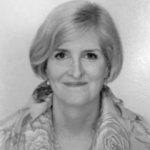 Mary is an Associate in Health Policy and Clinical Evidence practice. She received her Bachelor of Science in Nursing from Georgetown University in Washington, D.C., and maintains her U.S. license as a Registered Nurse. She obtained a Master’s in Public Health with a focus on health policy and comparative health systems; a second Master’s focused on political science and comparative politics; and, a Doctorate in medical innovation, technology development and the role of public-private partnerships from Columbia University in New York City. Mary has experience in health policy, communications and public affairs domestically and globally in addition to experience in the pharmaceutical industry and pharmaceutical marketing and advertising in New York. Mary has worked at the World Health Organization and The Commonwealth Fund, concentrating on women’s health and related socioeconomic issues, and as a public health strategist and senior scientist for the UK’s Health Protection Agency with an emphasis on infectious disease and pandemic preparedness. Mary has held professorships in public health at the University of Surrey, Icahn School of Medicine at Mount Sinai Medical Center, and the State University of New York College of Old Westbury. Mary’s career has led to a comprehensive knowledge of the health ecosystem with expertise in building and managing relationships with key stakeholders locally, nationally and globally.
Mary is an Associate in Health Policy and Clinical Evidence practice. She received her Bachelor of Science in Nursing from Georgetown University in Washington, D.C., and maintains her U.S. license as a Registered Nurse. She obtained a Master’s in Public Health with a focus on health policy and comparative health systems; a second Master’s focused on political science and comparative politics; and, a Doctorate in medical innovation, technology development and the role of public-private partnerships from Columbia University in New York City. Mary has experience in health policy, communications and public affairs domestically and globally in addition to experience in the pharmaceutical industry and pharmaceutical marketing and advertising in New York. Mary has worked at the World Health Organization and The Commonwealth Fund, concentrating on women’s health and related socioeconomic issues, and as a public health strategist and senior scientist for the UK’s Health Protection Agency with an emphasis on infectious disease and pandemic preparedness. Mary has held professorships in public health at the University of Surrey, Icahn School of Medicine at Mount Sinai Medical Center, and the State University of New York College of Old Westbury. Mary’s career has led to a comprehensive knowledge of the health ecosystem with expertise in building and managing relationships with key stakeholders locally, nationally and globally.
Paula Caballero
Managing Director, Lands for Life Program, Rare
 Paula Caballero serves as Rare’s Managing Director for Climate and Water. Caballero is recognized globally for her role in spearheading and shaping the UN’s Sustainable Development Goals. She has been a widely recognized player in helping to shape the international climate change regime. Caballero leads Rare’s emerging global portfolio on climate change, with a special emphasis on networking and scaling community-led solutions for adaptation and mitigation in Colombia, Brazil, China, Indonesia, Mozambique, the Philippines and Small Island Developing States across Micronesia. Prior to joining Rare, Caballero worked on a broad range of sustainable development issues with the United Nations Development Program, the Colombian government, multi-lateral banks, NGOs, other civil society organizations, and the private sector. Most recently, Caballero served as Global Director of the World Resource Institute’s (WRI) Climate Program. Prior to WRI, and prior to that she served as Senior Director of the World Bank’s Global Practice for Environment and Natural Resources.
Paula Caballero serves as Rare’s Managing Director for Climate and Water. Caballero is recognized globally for her role in spearheading and shaping the UN’s Sustainable Development Goals. She has been a widely recognized player in helping to shape the international climate change regime. Caballero leads Rare’s emerging global portfolio on climate change, with a special emphasis on networking and scaling community-led solutions for adaptation and mitigation in Colombia, Brazil, China, Indonesia, Mozambique, the Philippines and Small Island Developing States across Micronesia. Prior to joining Rare, Caballero worked on a broad range of sustainable development issues with the United Nations Development Program, the Colombian government, multi-lateral banks, NGOs, other civil society organizations, and the private sector. Most recently, Caballero served as Global Director of the World Resource Institute’s (WRI) Climate Program. Prior to WRI, and prior to that she served as Senior Director of the World Bank’s Global Practice for Environment and Natural Resources.
Michael Chaney
Founder and Executive Director, Project Sweetie Pie
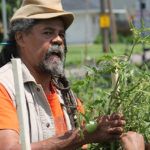 As an activist, youth advocate, organizer, and cultural artist, Michael Chaney has dedicated most of his life to implementing transformative initiatives and educational programs that provide real solutions to real problems for real people. What started as a catchy jingo grew into a social justice movement, grew into an initiative promoting educational reform, grew into an afterschool community education program, grew into an emerging nonprofit that supports the development of youth and families in educational initiatives centered around horticulture, entrepreneurship, marketing and promotions, “Project Sweetie Pie” continues to plant the “seeds of change.’ In 2010 when North High was under siege by the public school administrators that were elected to lead it, Project Sweetie Pie was born. It started as an act of social justice and social protest to save North High from the proposed threat of closure and has grown into a progressive non-profit that serves as an incubator of sustainable thought and action centered on horticulture, urban farming, and green business creation. It has seen the “green movement” steadily grow and continue to thrive in north Minneapolis and has played a key role in growing and providing the leadership and the vision for the movement. “Project Sweetie Pie” is breaking stereotypes, giving voice to the voiceless, transforming communities historically socially engineered to be consumers. “Project Sweetie Pie” is the story of a city that came together-worked together on a common goal, for the common good of the youth and families of it’s community. For it takes a village to raise a child.
As an activist, youth advocate, organizer, and cultural artist, Michael Chaney has dedicated most of his life to implementing transformative initiatives and educational programs that provide real solutions to real problems for real people. What started as a catchy jingo grew into a social justice movement, grew into an initiative promoting educational reform, grew into an afterschool community education program, grew into an emerging nonprofit that supports the development of youth and families in educational initiatives centered around horticulture, entrepreneurship, marketing and promotions, “Project Sweetie Pie” continues to plant the “seeds of change.’ In 2010 when North High was under siege by the public school administrators that were elected to lead it, Project Sweetie Pie was born. It started as an act of social justice and social protest to save North High from the proposed threat of closure and has grown into a progressive non-profit that serves as an incubator of sustainable thought and action centered on horticulture, urban farming, and green business creation. It has seen the “green movement” steadily grow and continue to thrive in north Minneapolis and has played a key role in growing and providing the leadership and the vision for the movement. “Project Sweetie Pie” is breaking stereotypes, giving voice to the voiceless, transforming communities historically socially engineered to be consumers. “Project Sweetie Pie” is the story of a city that came together-worked together on a common goal, for the common good of the youth and families of it’s community. For it takes a village to raise a child.
Joyce Chang
Managing Director and Chair of Global Research, JPMorgan Chase
 Joyce Chang is Chair of Global Research for J.P. Morgan’s Corporate and Investment Bank, a global leader in Banking, Markets and Investor Services. J.P. Morgan’s Global Research professionals study all sectors in which the firm does business, including equities, fixed income, currency and commodities, emerging markets, derivatives and structured finance. The Global Research team has been named the top global research firm for 2020 by Institutional Investor. Joyce was most recently Global Head of Research, a role she held for more than five years (2014-2019). She was previously Global Head of Fixed Income Research and began her career as an Emerging Markets Strategist. From 1997 through 2012, Joyce held top rankings in Institutional Investor surveys for Emerging Markets research, earning 25 #1 individual rankings. In 2014, she was inducted into the Fixed Income Analyst Society Hall of Fame. Joyce was a Managing Director at Merrill Lynch and Salomon Brothers prior to joining J.P. Morgan Chase in 1999. She serves on the Board of Directors of the German Marshall Fund, Trickle Up and Girls Inc. and on the external advisory board for the Center of Financial Stability. She is a member of the Council on Foreign Relations and the Inter-American Dialogue. She is the Senior Sponsor for J.P. Morgan’s Corporate and Investment Bank Women on the Move Network, the network for employees of Asian heritage (AsPIRE) and Nonprofit Board Service. She has been named as one of Top 25 Most Powerful Women in Finance by American Banker since 2012 and was included in Barron’s 2020 and 2021 lists of the 100 Most Influential Women in Finance. Joyce holds an M.P.A. from Princeton and serves on its External Advisory Council for the Center for Public Policy, and has a B.A. from Columbia from where she was awarded the John Jay award for professional achievement and serves on its Board of Visitors.
Joyce Chang is Chair of Global Research for J.P. Morgan’s Corporate and Investment Bank, a global leader in Banking, Markets and Investor Services. J.P. Morgan’s Global Research professionals study all sectors in which the firm does business, including equities, fixed income, currency and commodities, emerging markets, derivatives and structured finance. The Global Research team has been named the top global research firm for 2020 by Institutional Investor. Joyce was most recently Global Head of Research, a role she held for more than five years (2014-2019). She was previously Global Head of Fixed Income Research and began her career as an Emerging Markets Strategist. From 1997 through 2012, Joyce held top rankings in Institutional Investor surveys for Emerging Markets research, earning 25 #1 individual rankings. In 2014, she was inducted into the Fixed Income Analyst Society Hall of Fame. Joyce was a Managing Director at Merrill Lynch and Salomon Brothers prior to joining J.P. Morgan Chase in 1999. She serves on the Board of Directors of the German Marshall Fund, Trickle Up and Girls Inc. and on the external advisory board for the Center of Financial Stability. She is a member of the Council on Foreign Relations and the Inter-American Dialogue. She is the Senior Sponsor for J.P. Morgan’s Corporate and Investment Bank Women on the Move Network, the network for employees of Asian heritage (AsPIRE) and Nonprofit Board Service. She has been named as one of Top 25 Most Powerful Women in Finance by American Banker since 2012 and was included in Barron’s 2020 and 2021 lists of the 100 Most Influential Women in Finance. Joyce holds an M.P.A. from Princeton and serves on its External Advisory Council for the Center for Public Policy, and has a B.A. from Columbia from where she was awarded the John Jay award for professional achievement and serves on its Board of Visitors.
Joy DiBenedetto
Group Director for Global Communications, Corporate Affairs and Partnerships for Equity Group Holdings Plc.
 She is an award-winning entrepreneurial communications professional; a veteran journalist and media executive whose focus has always been global. She is the Founder of the international content and information company -HUM: Human Unlimited Media, Inc. (AKA, HUMNEWS.COM) and has covered major international events – from the studio and in the field – as a storyteller, producer and diplomat for more than 25 years. A founding partner in the C5 Collective, she has maximized the impact and brand awareness of social innovators, corporations, NGO’s, media, academia, and service organizations worldwide. She is the Immediate Past President/CEO of the Nobel Peace Prize-nominated Friendship Force International (FFI), and was previously the Global Vice President of Network Booking and Research for CNN Worldwide; starting her career in Corporate Finance with Turner Broadcasting. Her career squarely spans the media industry as well as humanitarian interests and always builds on the intersection of both for the greatest social impact. Joy holds a Bachelor’s degree in Speech Pathology and Audiology from Marymount Manhattan College in New York City.
She is an award-winning entrepreneurial communications professional; a veteran journalist and media executive whose focus has always been global. She is the Founder of the international content and information company -HUM: Human Unlimited Media, Inc. (AKA, HUMNEWS.COM) and has covered major international events – from the studio and in the field – as a storyteller, producer and diplomat for more than 25 years. A founding partner in the C5 Collective, she has maximized the impact and brand awareness of social innovators, corporations, NGO’s, media, academia, and service organizations worldwide. She is the Immediate Past President/CEO of the Nobel Peace Prize-nominated Friendship Force International (FFI), and was previously the Global Vice President of Network Booking and Research for CNN Worldwide; starting her career in Corporate Finance with Turner Broadcasting. Her career squarely spans the media industry as well as humanitarian interests and always builds on the intersection of both for the greatest social impact. Joy holds a Bachelor’s degree in Speech Pathology and Audiology from Marymount Manhattan College in New York City.
Dr. Qo Dongyu
Director-General, Food and Agriculture Organization of the United Nations
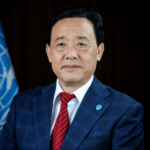 Qu Dongyu, who took office on 1 August 2019 as Director-General of the Food and Agriculture Organization of the United Nations, has spent his life working on how to make sure the world is fed. Born in 1963 to a rice-growing family in China’s Hunan Province, Qu studied horticultural science at Hunan Agricultural University and then plant breeding and genetics at the Chinese Academy of Agricultural Sciences. He later added environmental science to his knowledge portfolio while earning a PhD at Wageningen University, in the Netherlands. He then progressed through a range of national and international activities, engaged simultaneously in science and management, all during a time when China’s reform and opening-up process led the country to dramatically reduce poverty and hunger in a country with 20 percent of the global population, 9 percent of the world’s cultivated land, and where over 90 percent of the rural population is engaged in smallholder farm operations working less than 3 hectares. His vision is founded on the belief that freedom from hunger is a basic human right, and that in the 21st century we have the capability to eradicate chronic food insecurity. While challenges loom, Qu’s cardinal principle is that “problems can also be the source of progress.” Before coming to FAO, Qu served as China’s Vice Minister of Agriculture and Rural Affairs, where one of his achievements was to promote inclusive and innovative development and make sure information and communication technologies (ICT) were available in rural areas so that more than 400 million farmers could use their smartphones as a new farming tool. That vision has been consistent across a professional career that includes periods in central and local government, in and leading research institutes, and as a human resources leader at the China Three Gorges Project Development Corporation, a $40 billion investment project. Among his national initiatives has been to improve reporting of wholesale prices for agricultural products in China and foster the establishment of more than 100 specialty production areas geared to making local comparative advantages work to the benefit of local farmers. As Vice Governor of Ningxia Hui Autonomous Region, one of China’s landlocked and poorest areas, Qu formulated action plans aimed at poverty reduction, disaster reduction and prevention, women empowerment, agritourism and mutual learning platforms designed to boost trust between ethnic groups.
Qu Dongyu, who took office on 1 August 2019 as Director-General of the Food and Agriculture Organization of the United Nations, has spent his life working on how to make sure the world is fed. Born in 1963 to a rice-growing family in China’s Hunan Province, Qu studied horticultural science at Hunan Agricultural University and then plant breeding and genetics at the Chinese Academy of Agricultural Sciences. He later added environmental science to his knowledge portfolio while earning a PhD at Wageningen University, in the Netherlands. He then progressed through a range of national and international activities, engaged simultaneously in science and management, all during a time when China’s reform and opening-up process led the country to dramatically reduce poverty and hunger in a country with 20 percent of the global population, 9 percent of the world’s cultivated land, and where over 90 percent of the rural population is engaged in smallholder farm operations working less than 3 hectares. His vision is founded on the belief that freedom from hunger is a basic human right, and that in the 21st century we have the capability to eradicate chronic food insecurity. While challenges loom, Qu’s cardinal principle is that “problems can also be the source of progress.” Before coming to FAO, Qu served as China’s Vice Minister of Agriculture and Rural Affairs, where one of his achievements was to promote inclusive and innovative development and make sure information and communication technologies (ICT) were available in rural areas so that more than 400 million farmers could use their smartphones as a new farming tool. That vision has been consistent across a professional career that includes periods in central and local government, in and leading research institutes, and as a human resources leader at the China Three Gorges Project Development Corporation, a $40 billion investment project. Among his national initiatives has been to improve reporting of wholesale prices for agricultural products in China and foster the establishment of more than 100 specialty production areas geared to making local comparative advantages work to the benefit of local farmers. As Vice Governor of Ningxia Hui Autonomous Region, one of China’s landlocked and poorest areas, Qu formulated action plans aimed at poverty reduction, disaster reduction and prevention, women empowerment, agritourism and mutual learning platforms designed to boost trust between ethnic groups.
John Ellenberger
Senior VP, Land O’Lakes Venture37
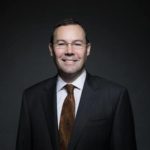 John leads Land O’Lakes Venture37, a 501(c)(3) global nonprofit founded in 1981 by Land O’Lakes, Inc. He assumed the role in January, 2017 after leading U.S. Dairy Foods and dairy foods teams since 2008. Before joining Land O’Lakes, John led corporate marketing at American Medical Systems and spent 15 years in various marketing leadership roles at General Mills. John serves on the boards of ServeMinnesota and Gillette Children’s Specialty Healthcare. He earned his bachelor’s degree and MBA from the University of Minnesota.
John leads Land O’Lakes Venture37, a 501(c)(3) global nonprofit founded in 1981 by Land O’Lakes, Inc. He assumed the role in January, 2017 after leading U.S. Dairy Foods and dairy foods teams since 2008. Before joining Land O’Lakes, John led corporate marketing at American Medical Systems and spent 15 years in various marketing leadership roles at General Mills. John serves on the boards of ServeMinnesota and Gillette Children’s Specialty Healthcare. He earned his bachelor’s degree and MBA from the University of Minnesota.
Johanna Mendelson Forman
Founder/CEO, Conflict Cuisine, School of International Service, American University
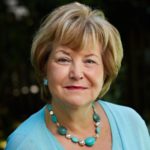 Johanna Mendelson Forman is a premier expert on gastrodiplomacy, social gastronomy and how food is central to survival and resilience in the world’s most active conflict zones. Her lifelong career working with some of the leading organizations in this space led her to create Conflict Cuisine®: An Introduction to War and Peace Around the Dinner Table – a course and curriculum designed to educate about food security, culinary and gastrodiplomacy and the issues she about which she is so passionate. Utilizing the Conflict Cuisine® curriculum, Johanna challenges others to explore new ways of looking at diplomacy, conflict resolution, civic engagement and how food can drive these issues in the 21st Century. In establishing this link between food and conflict, Johanna has developed a new interdisciplinary platform examining why food is central to survival and resilience in conflict zones. Read more about the Conflict Cuisine® curriculum, or check out the Conflict Cuisine® resources page.
Johanna Mendelson Forman is a premier expert on gastrodiplomacy, social gastronomy and how food is central to survival and resilience in the world’s most active conflict zones. Her lifelong career working with some of the leading organizations in this space led her to create Conflict Cuisine®: An Introduction to War and Peace Around the Dinner Table – a course and curriculum designed to educate about food security, culinary and gastrodiplomacy and the issues she about which she is so passionate. Utilizing the Conflict Cuisine® curriculum, Johanna challenges others to explore new ways of looking at diplomacy, conflict resolution, civic engagement and how food can drive these issues in the 21st Century. In establishing this link between food and conflict, Johanna has developed a new interdisciplinary platform examining why food is central to survival and resilience in conflict zones. Read more about the Conflict Cuisine® curriculum, or check out the Conflict Cuisine® resources page.
Tulsi Giri
Co-Creator, Food Networks and Social Entrepreneur
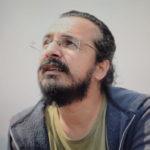 Tulsi Giri is a dreamer with entrepreneurial zeal for sustainable food systems from Nepal. He has been working in local, national and international arenas for the same since more than a decade.
Tulsi Giri is a dreamer with entrepreneurial zeal for sustainable food systems from Nepal. He has been working in local, national and international arenas for the same since more than a decade.
Michelle Grogg
Vice President, Corporate Responsibility and Sustainable Development Executive Director, Cargill Foundation, Cargill, Incorporated
 Michelle Grogg leads Global Corporate Responsibility at Cargill and is the Executive Director of the Cargill Foundation. She joined Cargill in 1998. Michelle is responsible for leading the company’s global corporate responsibility efforts including the development and implementation of strategic partnerships with non-governmental, nonprofit and international development organizations to advance the company’s social and environmental priorities. Michelle and her team direct Cargill’s global philanthropy, community engagement, employee volunteerism and advise Cargill businesses on corporate responsibility, sustainable development, stakeholder relations and issues management. Michelle serves as Cargill’s Liaison Delegate to the World Business Council on Sustainable Development, is a member of the AchieveMpls board of directors and a member of the ONE Global Leadership Circle. Previously, she served as Chairperson for the Conference Board Corporate Responsibility Council, member of the Executive Committee for the Center for Corporate Citizenship at Boston College, the Points of Light Foundation National Council on Workplace Volunteerism, and the Global Water Challenge steering committee.
Michelle Grogg leads Global Corporate Responsibility at Cargill and is the Executive Director of the Cargill Foundation. She joined Cargill in 1998. Michelle is responsible for leading the company’s global corporate responsibility efforts including the development and implementation of strategic partnerships with non-governmental, nonprofit and international development organizations to advance the company’s social and environmental priorities. Michelle and her team direct Cargill’s global philanthropy, community engagement, employee volunteerism and advise Cargill businesses on corporate responsibility, sustainable development, stakeholder relations and issues management. Michelle serves as Cargill’s Liaison Delegate to the World Business Council on Sustainable Development, is a member of the AchieveMpls board of directors and a member of the ONE Global Leadership Circle. Previously, she served as Chairperson for the Conference Board Corporate Responsibility Council, member of the Executive Committee for the Center for Corporate Citizenship at Boston College, the Points of Light Foundation National Council on Workplace Volunteerism, and the Global Water Challenge steering committee.
Nicola Gryczka
Co-Founder, Social Gastronomy Movement; Social and Systems Entrepreneur; Food Activist; and Change-Maker
 Gryczka is a co-founder and currently leading the Social Gastronomy Movement (SGM), a global network of interconnected local communities that uses the power of food as a tool for social change. The Social Gastronomy Movement cultivates connections, collaborations and partnerships that strengthen our individual and collective capacity to co-create an equitable future, inclusive society and healthy planet. SGM advocates for positive changes in local food systems so that together we move towards global progress creating a new ecosystem for change. She sits on the board of social organizations such as Gastromotiva in Brazil and LIFE project in Turkey, while actively coaching young women and social entrepreneurs around the world. Her passion lies at the cross road of grass root activism and policy making towards systems change, especially in fields of food, agriculture and education, at the intersection with technology and innovation. Gryczka has become a motivational speaker and consultant at renowned organizations and events such as IADB, FAO, WFP, WEF and SxSW among others.
Gryczka is a co-founder and currently leading the Social Gastronomy Movement (SGM), a global network of interconnected local communities that uses the power of food as a tool for social change. The Social Gastronomy Movement cultivates connections, collaborations and partnerships that strengthen our individual and collective capacity to co-create an equitable future, inclusive society and healthy planet. SGM advocates for positive changes in local food systems so that together we move towards global progress creating a new ecosystem for change. She sits on the board of social organizations such as Gastromotiva in Brazil and LIFE project in Turkey, while actively coaching young women and social entrepreneurs around the world. Her passion lies at the cross road of grass root activism and policy making towards systems change, especially in fields of food, agriculture and education, at the intersection with technology and innovation. Gryczka has become a motivational speaker and consultant at renowned organizations and events such as IADB, FAO, WFP, WEF and SxSW among others.
Jocelyn Brown Hall
Director, North American Liaison Office of the Food and Agriculture Organization of the United Nations (FAO)
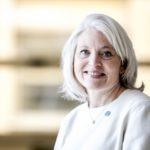 Jocelyn Brown Hall is the Director of the Food and Agriculture Organization of the United Nations (FAO) Liaison Office for North America based in Washington, DC. She joined the office on 14 June 2021. Prior to this role she served as the Deputy Regional Representative for the FAO Regional Office for Africa, where she oversaw 47 FAO country offices in Africa and guides their strategy and communications around food security. She also serves as the FAO Representative for Ghana, where she worked with ministries of agriculture, fisheries, social protection and trade. In 1998, Brown Hall joined the U.S. Department of Agriculture (USDA) in the Foreign Agricultural Service, where she coordinated USDA’s international development and training programs. She was the lead expert on USDA’s technical relationship with international organizations such as FAO, the Inter-American Institute for Cooperation in Agriculture, and various international research centers. In 2015, Brown Hall was appointed Deputy Administrator in the Foreign Agricultural Service where she led the USDA’s USD $2 billion food and technical assistance programs in low- and middle-income countries. In this position, she oversaw USDA’s international food and technical assistance programs, including the McGovern-Dole Food for Education and Child Nutrition Program, the Food for Progress Program, the Cochran and Borlaug Fellowship Programs, and numerous technical assistance projects that promote U.S. government food security and trade capacity building goals. Brown Hall began her career teaching English at an agricultural university in Peshawar, Pakistan, while serving in the Peace Corps. She then ran the largest income generation program for Afghan women refugees in Pakistan for Save the Children, until she was evacuated from that country during the first Gulf War. Upon returning to the United States, she worked in the private sector where she served as Special Assistant to the President and CEO of Development Associates and for the government of the District of Columbia, where she addressed procurement, financial, and human resources issues under the Office of the Chief Financial Officer. Brown Hall holds a master’s degree in Business Administration in International Business and Development from the George Washington University and graduated magna cum laude from Harvard University with a bachelor’s degree in American Literature.
Jocelyn Brown Hall is the Director of the Food and Agriculture Organization of the United Nations (FAO) Liaison Office for North America based in Washington, DC. She joined the office on 14 June 2021. Prior to this role she served as the Deputy Regional Representative for the FAO Regional Office for Africa, where she oversaw 47 FAO country offices in Africa and guides their strategy and communications around food security. She also serves as the FAO Representative for Ghana, where she worked with ministries of agriculture, fisheries, social protection and trade. In 1998, Brown Hall joined the U.S. Department of Agriculture (USDA) in the Foreign Agricultural Service, where she coordinated USDA’s international development and training programs. She was the lead expert on USDA’s technical relationship with international organizations such as FAO, the Inter-American Institute for Cooperation in Agriculture, and various international research centers. In 2015, Brown Hall was appointed Deputy Administrator in the Foreign Agricultural Service where she led the USDA’s USD $2 billion food and technical assistance programs in low- and middle-income countries. In this position, she oversaw USDA’s international food and technical assistance programs, including the McGovern-Dole Food for Education and Child Nutrition Program, the Food for Progress Program, the Cochran and Borlaug Fellowship Programs, and numerous technical assistance projects that promote U.S. government food security and trade capacity building goals. Brown Hall began her career teaching English at an agricultural university in Peshawar, Pakistan, while serving in the Peace Corps. She then ran the largest income generation program for Afghan women refugees in Pakistan for Save the Children, until she was evacuated from that country during the first Gulf War. Upon returning to the United States, she worked in the private sector where she served as Special Assistant to the President and CEO of Development Associates and for the government of the District of Columbia, where she addressed procurement, financial, and human resources issues under the Office of the Chief Financial Officer. Brown Hall holds a master’s degree in Business Administration in International Business and Development from the George Washington University and graduated magna cum laude from Harvard University with a bachelor’s degree in American Literature.
Collen Vixen Kelapile
President, United Nations Economic and Social Council
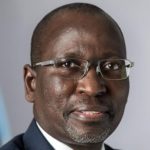 His Excellency Collen Vixen Kelapile was elected the 77th President of the Economic and Social Council at the United Nations on 23 July 2021. Ambassador Vixen Kelapile is currently the Ambassador and Permanent Representative of Botswana to the United Nations in New York. He has an accumulated career of 26 years in multilateral diplomacy, both as a government representative, intergovernmental expert and is also a former United Nations (UN) Secretariat staff member. Before his appointment in 2018 as Ambassador and Permanent Representative to the UN in New York, he was the Chief of Staff to the Executive-Secretary of the UN Economic Commission for Africa (UNECA) in Addis Ababa, Ethiopia, from 2014 to 2018. From 2013 to 2014, he served as the Deputy Director in the Department of Africa and the Middle East at the Ministry of International Affairs and Cooperation of Botswana overseeing Central, East, North and West Africa as well as the Middle East. He was elected by the UN General Assembly as a member of the Advisory Committee on Administrative and Budgetary Questions (ACABQ) from 2004 to 2012, where he served for three consecutive 3-year terms amounting. During his tenure in the Committee, he served as Vice-Chair of the ACABQ from 2008 to 2010 and subsequently as its Chair from 2011 to 2012.
His Excellency Collen Vixen Kelapile was elected the 77th President of the Economic and Social Council at the United Nations on 23 July 2021. Ambassador Vixen Kelapile is currently the Ambassador and Permanent Representative of Botswana to the United Nations in New York. He has an accumulated career of 26 years in multilateral diplomacy, both as a government representative, intergovernmental expert and is also a former United Nations (UN) Secretariat staff member. Before his appointment in 2018 as Ambassador and Permanent Representative to the UN in New York, he was the Chief of Staff to the Executive-Secretary of the UN Economic Commission for Africa (UNECA) in Addis Ababa, Ethiopia, from 2014 to 2018. From 2013 to 2014, he served as the Deputy Director in the Department of Africa and the Middle East at the Ministry of International Affairs and Cooperation of Botswana overseeing Central, East, North and West Africa as well as the Middle East. He was elected by the UN General Assembly as a member of the Advisory Committee on Administrative and Budgetary Questions (ACABQ) from 2004 to 2012, where he served for three consecutive 3-year terms amounting. During his tenure in the Committee, he served as Vice-Chair of the ACABQ from 2008 to 2010 and subsequently as its Chair from 2011 to 2012.
Dr. Rupa Marya
Founder and Executive Director of Deep Medicine Circle
 Rupa Marya is a physician, activist, artist and writer who is an Associate Professor of Medicine at the University of California, San Francisco and the founder and executive director of the Deep Medicine Circle, a worker-directed nonprofit committed to healing the wounds of colonialism through food, medicine, story, learning and restoration. In 2021, she published her first book with political ecologist, food system activist and policy professor Raj Patel, Inflamed: Deep Medicine and the Anatomy of Injustice. This book advances a new level of diagnosis that incorporates history and lines of power into our understanding of the root causes of health disparities and the rise of inflammatory disease in industrialized places, offering compelling treatment options for what is ailing people and the planet.
Rupa Marya is a physician, activist, artist and writer who is an Associate Professor of Medicine at the University of California, San Francisco and the founder and executive director of the Deep Medicine Circle, a worker-directed nonprofit committed to healing the wounds of colonialism through food, medicine, story, learning and restoration. In 2021, she published her first book with political ecologist, food system activist and policy professor Raj Patel, Inflamed: Deep Medicine and the Anatomy of Injustice. This book advances a new level of diagnosis that incorporates history and lines of power into our understanding of the root causes of health disparities and the rise of inflammatory disease in industrialized places, offering compelling treatment options for what is ailing people and the planet.
Charles McNeill
Senior Advisor, Forest and Climate, UN Environment Program (UNEP)
 Charles McNeill holds a Ph.D. in Genetics, with a focus on conservation biology from the University of California, Davis. Formerly, he held several academic posts addressing a range of environmental and development issues; with the non-governmental sector on hunger eradication and sustainable development programs in South Asia and Africa. In 1992, he joined UNDP; formerly managed the Global Environment Facility (GEF) work throughout Africa; then responsible for UNDP-GEF global policy and programming. He’s a Senior Policy Adviser, Environment & Energy Group (EEG), UNDP’s Bureau for Development Policy, responsible for policy coherence, partnerships, strategic initiatives and advocacy related to biodiversity and ecosystems, climate change, sustainable energy, land and water management, and other areas. In the context of the UN Secretary-General’s ‘Climate Summit’ on 23 September 2014, Charles was responsible for organizing the Forest action area, one of the main elements of the Summit, by coordinating a global multilateral team of countries, companies and civil society organizations to contribute major announcements for the Summit on reducing deforestation and increasing restoration. 2007, co-founded the UN-REDD Programme.
Charles McNeill holds a Ph.D. in Genetics, with a focus on conservation biology from the University of California, Davis. Formerly, he held several academic posts addressing a range of environmental and development issues; with the non-governmental sector on hunger eradication and sustainable development programs in South Asia and Africa. In 1992, he joined UNDP; formerly managed the Global Environment Facility (GEF) work throughout Africa; then responsible for UNDP-GEF global policy and programming. He’s a Senior Policy Adviser, Environment & Energy Group (EEG), UNDP’s Bureau for Development Policy, responsible for policy coherence, partnerships, strategic initiatives and advocacy related to biodiversity and ecosystems, climate change, sustainable energy, land and water management, and other areas. In the context of the UN Secretary-General’s ‘Climate Summit’ on 23 September 2014, Charles was responsible for organizing the Forest action area, one of the main elements of the Summit, by coordinating a global multilateral team of countries, companies and civil society organizations to contribute major announcements for the Summit on reducing deforestation and increasing restoration. 2007, co-founded the UN-REDD Programme.
Maureen Muketha
Youth Activist, and Founder, Tule Vyema
 Maureen Muketha is a youth nutrition advocate passionate about the achievement of SDG 2, a member of the UN Food System Summit Action Track 1 leadership team and a core group member of the Act4food Act4Change Campaign. She is the founder of a social enterprise called Tule Vyema. Maureen rolls up her sleeves to do what she loves best – fighting hunger, malnutrition and poverty. Tule Vyema has equipped over 2,000 community members with nutrition knowledge and improved food security through training young women to cultivate indigenous vegetables on kitchen gardens in over 800 low income earning households. Maureen’s transformative work through Tule Vyema has been recognized by local and global organizations such as Forbes, Shawn Mendes Foundation, UNESCO MGIEP, Food Tank, Croplife International, Oxfam and Global Changemakers.
Maureen Muketha is a youth nutrition advocate passionate about the achievement of SDG 2, a member of the UN Food System Summit Action Track 1 leadership team and a core group member of the Act4food Act4Change Campaign. She is the founder of a social enterprise called Tule Vyema. Maureen rolls up her sleeves to do what she loves best – fighting hunger, malnutrition and poverty. Tule Vyema has equipped over 2,000 community members with nutrition knowledge and improved food security through training young women to cultivate indigenous vegetables on kitchen gardens in over 800 low income earning households. Maureen’s transformative work through Tule Vyema has been recognized by local and global organizations such as Forbes, Shawn Mendes Foundation, UNESCO MGIEP, Food Tank, Croplife International, Oxfam and Global Changemakers.
Dr. Eduard Müller
Roadmapping National-Scale Regeneration Working Group, Co-Chair
 Dr. Eduard Müller is Founder and Rector of the University for International Cooperation since 1994 working on permanent innovation in education, leading UCI to be a pioneer in online education in over 60 countries. He has overseen the launch of many innovative programs in many different fields. He has visited over 90 countries and carried out professional activities in more than 35 of them on all continents, having given more than 200 international conferences in recent years on global change and regenerative development. He is currently globally recognized for his work in Regenerative Development having established with more than 20 global partners the Regenerate Costa Rica Hub in 2018 which has grown to a road-mapping process for the regeneration of the country. He collaborated in the launch of the Global Network of Regenerative Communities with Capital Institute. He has 40 years of experience in conservation and development work. He has been an international consultant among others for GTZ / GIZ, UNDP, World Bank, UNESCO, IAEA, Convention on Biological Diversity (also as negotiator), National and Provincial Congresses, central and local governments, various organizations, as well as peasant and indigenous communities. He is currently a member of the World Intellectual Forum, India; Senior Lecturer, UNESCO Chair of Biosphere Reserves and Natural and Mixed Heritage Sites at UCI; member of the Scientific Council on Climate Change – 4C of Costa Rica and; Member of the Global Council of the Wellbeing Economy Alliance – WEAll.
Dr. Eduard Müller is Founder and Rector of the University for International Cooperation since 1994 working on permanent innovation in education, leading UCI to be a pioneer in online education in over 60 countries. He has overseen the launch of many innovative programs in many different fields. He has visited over 90 countries and carried out professional activities in more than 35 of them on all continents, having given more than 200 international conferences in recent years on global change and regenerative development. He is currently globally recognized for his work in Regenerative Development having established with more than 20 global partners the Regenerate Costa Rica Hub in 2018 which has grown to a road-mapping process for the regeneration of the country. He collaborated in the launch of the Global Network of Regenerative Communities with Capital Institute. He has 40 years of experience in conservation and development work. He has been an international consultant among others for GTZ / GIZ, UNDP, World Bank, UNESCO, IAEA, Convention on Biological Diversity (also as negotiator), National and Provincial Congresses, central and local governments, various organizations, as well as peasant and indigenous communities. He is currently a member of the World Intellectual Forum, India; Senior Lecturer, UNESCO Chair of Biosphere Reserves and Natural and Mixed Heritage Sites at UCI; member of the Scientific Council on Climate Change – 4C of Costa Rica and; Member of the Global Council of the Wellbeing Economy Alliance – WEAll.
Dr. James Mwangi, CBS
Group Managing Director and CEO, Equity Group Holdings Plc., Executive Chairman, Equity Group Foundation
 Dr. James Mwangi is one of Africa’s most renowned thought leaders, a disruptive entrepreneur and philanthropist. As a champion of social economic transformation, James believes that individuals and societies have the potential to solve their socioeconomic challenges if they are given the opportunity and access to resources. In 1991, James joined Equity Building Society, a technically insolvent financial institution that had been threatened with closure by the regulator. He was driven by the vision of Equity to advocate for formal financial access to the 96% Kenyan population excluded and condemned as un-bankable. The belief systems that were inculcated in James by his mother from a tender age, of discipline, hard work, giving back to society, as well as humility has continued to influence and shape the culture and brand of Equity. His leadership approach personified the value system and corporate philosophies of the Group. The institution has differentiated itself through a unique emotional connection with its customers, a team spirit among staff founded on the ‘power of one’, passion and joy of work. As a champion of financial inclusion, James is credited with democratizing financial access, by removing entry barriers in Kenya and the region. As a disruptive and turnaround leader, he pioneered a savings led microfinance revolution giving the largely excluded majority of un-banked households, businesses, enterprises, and communities in the country the opportunity for broader economic participation. Driven by the commitment to scale up shared prosperity and social impact interventions that transform lives and livelihoods, James initiated the establishment of Equity Group Foundation (EGF), the social arm of Equity Group, in 2008. EGF implements innovative programs that leverage on the infrastructure of the bank achieving a higher social return on investment. While serving as the Executive Chairman, he has shaped notable EGF programs and mobilized the support of like-minded partners to commit USD 447 million for social impact, such as scholarships for socioeconomically challenged children, support for health clinics in underprivileged areas, and financially literacy classes for women who are otherwise without access.
Dr. James Mwangi is one of Africa’s most renowned thought leaders, a disruptive entrepreneur and philanthropist. As a champion of social economic transformation, James believes that individuals and societies have the potential to solve their socioeconomic challenges if they are given the opportunity and access to resources. In 1991, James joined Equity Building Society, a technically insolvent financial institution that had been threatened with closure by the regulator. He was driven by the vision of Equity to advocate for formal financial access to the 96% Kenyan population excluded and condemned as un-bankable. The belief systems that were inculcated in James by his mother from a tender age, of discipline, hard work, giving back to society, as well as humility has continued to influence and shape the culture and brand of Equity. His leadership approach personified the value system and corporate philosophies of the Group. The institution has differentiated itself through a unique emotional connection with its customers, a team spirit among staff founded on the ‘power of one’, passion and joy of work. As a champion of financial inclusion, James is credited with democratizing financial access, by removing entry barriers in Kenya and the region. As a disruptive and turnaround leader, he pioneered a savings led microfinance revolution giving the largely excluded majority of un-banked households, businesses, enterprises, and communities in the country the opportunity for broader economic participation. Driven by the commitment to scale up shared prosperity and social impact interventions that transform lives and livelihoods, James initiated the establishment of Equity Group Foundation (EGF), the social arm of Equity Group, in 2008. EGF implements innovative programs that leverage on the infrastructure of the bank achieving a higher social return on investment. While serving as the Executive Chairman, he has shaped notable EGF programs and mobilized the support of like-minded partners to commit USD 447 million for social impact, such as scholarships for socioeconomically challenged children, support for health clinics in underprivileged areas, and financially literacy classes for women who are otherwise without access.
Dr. Raj Patel
Award-winning Author, Filmmaker, and Research Professor in the Lyndon B. Johnson School of Public Affairs at the University of Texas, Austin
 Raj Patel is an award-winning author, filmmaker and academic. He is a Research Professor in the Lyndon B. Johnson School of Public Affairs at the University of Texas, Austin and a Senior Research Associate at the Unit for the Humanities at the university currently known as Rhodes University (UHURU), South Africa. He has degrees from the University of Oxford, the London School of Economics, and Cornell University, has worked for the World Bank and WTO, and protested against them around the world. Raj co-taught the 2014 Edible Education class at UC Berkeley with Michael Pollan. In 2016 he was recognized with a James Beard Foundation Leadership Award. He has testified about the causes of the global food crisis to the US, UK and EU governments and is a member of the International Panel of Experts on Sustainable Food Systems. His first book was Stuffed and Starved: The Hidden Battle for the World Food System. His second, The Value of Nothing, was a New York Times and international best-seller. He is the co-author with Jason W. Moore of A History of the World in Seven Cheap Things. His acclaimed latest book, co-authored with Rupa Marya, entitled Inflamed: Deep Medicine and The Anatomy of Injustice launched in August 2021. His first film, co-directed with Zak Piper and filmed over the course of a decade in Malawi and the United States, is the award-winning documentary The Ants & The Grasshopper. He can be heard co-hosting the fortnightly food politics podcast The Secret Ingredient with Mother Jones’ Tom Philpott, and KUT’s Rebecca McInroy.
Raj Patel is an award-winning author, filmmaker and academic. He is a Research Professor in the Lyndon B. Johnson School of Public Affairs at the University of Texas, Austin and a Senior Research Associate at the Unit for the Humanities at the university currently known as Rhodes University (UHURU), South Africa. He has degrees from the University of Oxford, the London School of Economics, and Cornell University, has worked for the World Bank and WTO, and protested against them around the world. Raj co-taught the 2014 Edible Education class at UC Berkeley with Michael Pollan. In 2016 he was recognized with a James Beard Foundation Leadership Award. He has testified about the causes of the global food crisis to the US, UK and EU governments and is a member of the International Panel of Experts on Sustainable Food Systems. His first book was Stuffed and Starved: The Hidden Battle for the World Food System. His second, The Value of Nothing, was a New York Times and international best-seller. He is the co-author with Jason W. Moore of A History of the World in Seven Cheap Things. His acclaimed latest book, co-authored with Rupa Marya, entitled Inflamed: Deep Medicine and The Anatomy of Injustice launched in August 2021. His first film, co-directed with Zak Piper and filmed over the course of a decade in Malawi and the United States, is the award-winning documentary The Ants & The Grasshopper. He can be heard co-hosting the fortnightly food politics podcast The Secret Ingredient with Mother Jones’ Tom Philpott, and KUT’s Rebecca McInroy.
Brett Ramey
Climate Resilience Planner, Iowa Tribe of Nebraska and Kansas
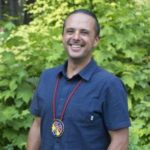 Brett Ramey (Iowa Tribe of Kansas and Nebraska) is a land-based educator and program designer working at intersections of ecological, cultural, and community health. His work has included designing and instructing courses on food sovereignty, collaborative garden design and Indigenous science at Tribal Universities and Native youth summer programs, facilitating healing retreats for cancer survivors and elevating equity and inclusion discourse within local, regional and National environmental organizations. Prior to moving to Dakota homelands in Minneapolis in January 2020, Brett served as Director for the Doris Duke Conservation Scholars Program at the University of Washington, a national undergraduate student program that infuses conservation practice with Indigenous knowledges and perspectives of land and environmental justice. Brett currently serves on the Steering Committee for the Castanea Fellowship – a national program for established food movement leaders, and is leading a collaborative funding process through the Regenerative Agriculture Foundation intended to direct resources and attention to BIPOC-led initiatives. Brett is a Climate Resilience Planner for the Iowa Tribe of Kansas and Nebraska.
Brett Ramey (Iowa Tribe of Kansas and Nebraska) is a land-based educator and program designer working at intersections of ecological, cultural, and community health. His work has included designing and instructing courses on food sovereignty, collaborative garden design and Indigenous science at Tribal Universities and Native youth summer programs, facilitating healing retreats for cancer survivors and elevating equity and inclusion discourse within local, regional and National environmental organizations. Prior to moving to Dakota homelands in Minneapolis in January 2020, Brett served as Director for the Doris Duke Conservation Scholars Program at the University of Washington, a national undergraduate student program that infuses conservation practice with Indigenous knowledges and perspectives of land and environmental justice. Brett currently serves on the Steering Committee for the Castanea Fellowship – a national program for established food movement leaders, and is leading a collaborative funding process through the Regenerative Agriculture Foundation intended to direct resources and attention to BIPOC-led initiatives. Brett is a Climate Resilience Planner for the Iowa Tribe of Kansas and Nebraska.
Tim Rhodd
Tribal Chairman, Iowa Tribe of Nebraska and Kansas
Chairman Timothy N. Rhodd was born in Falls City, Nebraska and has been a long-time resident of the Iowa Tribe of Kansas and Nebraska Reservation. He grew up attending all three school systems where he graduated from Falls City, Nebraska, and later attended Highland Community College where he studied in Business. After many years of service on the Executive Committee and recognition for his efforts in building a brighter future for the Tribe, Chairman Rhodd was elected to his first tenure as Tribal Secretary in October 2007, and then elected as the Tribal Chairman serving consecutive terms. As Tribal Chairman, Tim has assumed the duties of presiding over official tribal meetings, serving as the tribal spokesman, preserving tribal heritage, overseeing the day-to-day government operations and maintaining government-to-government relationships. He has developed various relationships with outside government officials from the State of Kansas, Nebraska and Missouri to Washington, D.C. Recent successes of Chairman Rhodd have been revamping the tribal government structure, implementing new ordinances (tribal laws), updating government policies, incorporating efficiency measures within the government, expanding the tribal enterprises, building a tribal economy while keeping our community safe during the pandemic. Chairman Rhodd envisions the Tribe focusing on higher education, bringing a trade school curriculum, regenerative agriculture, food sovereignty, maintaining a healthy business plan for future generations, diversification, and tribal self-sufficiency.
Mark Steffen, MD, MPH
Vice President and Chief Medical Officer, Blue Cross and Blue Shield of Minnesota
 As vice president and chief medical officer of Blue Cross and Blue Shield of Minnesota, Dr. Mark Steffen oversees medical and care management strategies that encompass the organization’s medical policies; quality and clinical programs; pharmacy; and clinical products. Dr. Steffen is also responsible for leading health care quality and affordability initiatives within the company’s medical management programs. Dr. Steffen came to Blue Cross in 2018 from Humana, where as a medical director he focused on population health and value-based care for patients with chronic kidney disease and end-stage renal disease. Previously, he spent five years at the Mayo Clinic as a medical director within Preventive, Occupational and Aerospace Medicine while also serving as education chair for the division. Dr. Steffen’s career in medical management leadership began with a three-year tenure as medical director for the Fairview Red Wing Medical Center, a position in which he collaborated with local businesses to improve health and control costs. Dr. Steffen began his work as a physician with an emphasis in rural family medicine practice. He has held a Mayo Clinic Quality Fellow certification at the Silver level since 2014 and at the Bronze level since 2011. Dr. Steffen received his bachelor’s degree in biochemistry from the University of Minnesota Duluth and both his medical degree and master’s in public health from the University of Minnesota.
As vice president and chief medical officer of Blue Cross and Blue Shield of Minnesota, Dr. Mark Steffen oversees medical and care management strategies that encompass the organization’s medical policies; quality and clinical programs; pharmacy; and clinical products. Dr. Steffen is also responsible for leading health care quality and affordability initiatives within the company’s medical management programs. Dr. Steffen came to Blue Cross in 2018 from Humana, where as a medical director he focused on population health and value-based care for patients with chronic kidney disease and end-stage renal disease. Previously, he spent five years at the Mayo Clinic as a medical director within Preventive, Occupational and Aerospace Medicine while also serving as education chair for the division. Dr. Steffen’s career in medical management leadership began with a three-year tenure as medical director for the Fairview Red Wing Medical Center, a position in which he collaborated with local businesses to improve health and control costs. Dr. Steffen began his work as a physician with an emphasis in rural family medicine practice. He has held a Mayo Clinic Quality Fellow certification at the Silver level since 2014 and at the Bronze level since 2011. Dr. Steffen received his bachelor’s degree in biochemistry from the University of Minnesota Duluth and both his medical degree and master’s in public health from the University of Minnesota.
Mariana Vasconcelos
Co-founder and CEO, Agrosmart
 Mariana Vasconcelos is a daughter of farmers, Co-Founder and CEO at Agrosmart, and recognized as a technology pioneer company by the World Economic Forum. With degrees from UNIFEI, ESALQ/USP, UCLA, and Singularity University, Mariana was nominated MIT Technology Review Innovators under 35, Forbes Under 30, and Fast Company 100 Most Creative. She is a global ambassador of Thought for Food, an expert in digital agriculture, and considered one of the 100 most influential agribusiness people by Dinheiro Rural Magazine.
Mariana Vasconcelos is a daughter of farmers, Co-Founder and CEO at Agrosmart, and recognized as a technology pioneer company by the World Economic Forum. With degrees from UNIFEI, ESALQ/USP, UCLA, and Singularity University, Mariana was nominated MIT Technology Review Innovators under 35, Forbes Under 30, and Fast Company 100 Most Creative. She is a global ambassador of Thought for Food, an expert in digital agriculture, and considered one of the 100 most influential agribusiness people by Dinheiro Rural Magazine.
Hon. Tim Walz
Governor of Minnesota
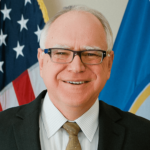 Tim Walz is Minnesota’s 41st Governor. His career has been defined by public service, from serving our country in the military to serving our students as a high-school teacher and football coach to serving our state in Congress. Born in a small town in rural Nebraska, Tim’s parents instilled in him the values that guide his commitment to common good and selfless service. Soon after his high school graduation, Tim enlisted in the Army National Guard. Tim attended Chadron State College, where he graduated with a social science degree in 1989. Harvard University offered Tim an opportunity to gain a new perspective on global education by teaching in the People’s Republic of China from 1989-90, where he joined of one of the first government-approved groups of American teachers to work in Chinese high schools. Upon his return from China to Nebraska, Tim served full time in the Army National Guard, and accepted a teaching and coaching position. More importantly, he met his wife, Gwen Whipple, who was teaching at the same school. Tim and Gwen Walz moved to Mankato in 1996, where they began working at Mankato West High School. In addition to teaching social studies, Tim helped coach the Mankato West football team that won the school’s first state championship. After 24 years in the Army National Guard, Command Sergeant Major Walz retired from the 1-125th Field Artillery Battalion in 2005. Tim won his first election to the United States House of Representatives in 2006, and was re-elected for another 5 terms serving Minnesota’s First Congressional District. In addition to his work on the Farm Bill, the Lewis & Clark Regional Water System, Minnesota Highway 14, and the Minnesota State Veterans Cemetery in Preston (MN), Tim introduced the STOCK Act, a bill that sought to limit congressional insider trading. On March 22, 2012, the STOCK Act passed with overwhelming bipartisan support in both the House and the Senate.
Tim Walz is Minnesota’s 41st Governor. His career has been defined by public service, from serving our country in the military to serving our students as a high-school teacher and football coach to serving our state in Congress. Born in a small town in rural Nebraska, Tim’s parents instilled in him the values that guide his commitment to common good and selfless service. Soon after his high school graduation, Tim enlisted in the Army National Guard. Tim attended Chadron State College, where he graduated with a social science degree in 1989. Harvard University offered Tim an opportunity to gain a new perspective on global education by teaching in the People’s Republic of China from 1989-90, where he joined of one of the first government-approved groups of American teachers to work in Chinese high schools. Upon his return from China to Nebraska, Tim served full time in the Army National Guard, and accepted a teaching and coaching position. More importantly, he met his wife, Gwen Whipple, who was teaching at the same school. Tim and Gwen Walz moved to Mankato in 1996, where they began working at Mankato West High School. In addition to teaching social studies, Tim helped coach the Mankato West football team that won the school’s first state championship. After 24 years in the Army National Guard, Command Sergeant Major Walz retired from the 1-125th Field Artillery Battalion in 2005. Tim won his first election to the United States House of Representatives in 2006, and was re-elected for another 5 terms serving Minnesota’s First Congressional District. In addition to his work on the Farm Bill, the Lewis & Clark Regional Water System, Minnesota Highway 14, and the Minnesota State Veterans Cemetery in Preston (MN), Tim introduced the STOCK Act, a bill that sought to limit congressional insider trading. On March 22, 2012, the STOCK Act passed with overwhelming bipartisan support in both the House and the Senate.